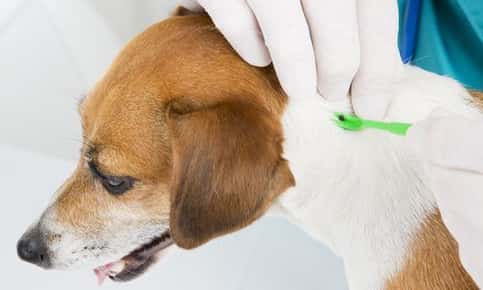
How to Keep Your Pets Safe from Lyme Disease and Other Illnesses During Flea and Tick Season
Warmer weather brings the return of fleas and ticks throughout the entire U.S. Fortunately, keeping your pet safe from these tiny but troublesome pests can be as easy as taking a few simple precautions.
Ticks Can Cause Long-Lasting Health Problems
Ticks are opportunists. They'll jump on the first warm body that passes by, whether that's you or your dog. The pests latch on to the skin and feed on your pet's blood. If they remain attached to the skin long enough, they'll also release the Borrelia burgdorferi bacteria into your pet's body. Transmission of the bacteria can occur in as little as 24 hours.
The bacteria causes Lyme disease, an illness responsible for joint inflammation, pain, swelling, stiffness, fever, lethargy, loss of appetite, and other symptoms. Depending on how quickly treatment begins, dogs may develop chronic health problems as a result of a Lyme disease infection. Cats can also develop Lyme disease, although infections have only occurred in cats in laboratory settings so far, according to Cornell Feline Health Center.
Ticks can also transmit other diseases to animals, including Rocky Mountain spotted fever, tick paralysis, ehrlichiosis, anaplasmosis, and bartonellosis. These diseases can cause a variety of symptoms, ranging from swollen lymph nodes to anemia and even death. Symptoms of tick-borne illnesses may not appear until several months after your pet has been infected.
If you examine your pet after a trip outside, you may see or feel ticks. Ticks like to burrow in out-of-the-way areas, such as between the toes, under the collar or at the base of the tail.
Do You Know How to Spot Signs of Flea Infestations?
Although flea bites usually aren't quite as serious as tick-borne illnesses, they can make your pet very uncomfortable. Since fleas reproduce fairly quickly, the entire family may soon start scratching. Fleas can also affect pet rabbits, guinea pigs, and other small animals.
Pets that have flea infestations may compulsively scratch, bite, or lick their skin, causing bald or raw spots. You may also notice flea "dirt," small black specks in your pet's fur. If an infestation is severe, or your pet is allergic to fleas, anemia can occur. Pets that are anemic may develop pale lips or gums, weakness, fatigue, and loss of appetite.
How You Can Protect Your Pet
Flea and tick preventive medications offer an easy way to safeguard your pet's health. The treatments kill adult ticks and fleas and also prevent larvae and eggs from maturing.
They're available in spot treatments, collars, sprays, shampoos, and other products. Before you use a preventive medication for the first time, check with your pet's veterinarian to make sure it's safe for your furry friend.
In addition to using preventive treatments, it's also important to:
- Keep Fleas and Ticks Out of Your Yard. Applying flea and tick spray monthly to grasses, shrubs and plants kill the pests before they can attack your pets. Wait for the sprays to dry completely before you let your pet walk through your yard.
- Remove Brush and Keep Grass Cut. Brush and debris create perfect habitats for many types of insects and pests. Removing it promptly can help you keep your pets and your family healthy. Fleas and ticks love long grass but keeping your lawn cut too short can be a problem too. If your grass is shorter than two inches, the spiders that prey on fleas will find new places to live.
- Fence Your Yard. You may treat your pets for fleas, but do your neighbors? Visiting cats and dogs can leave behind fleas even if they're only in your yard briefly. Fencing your yard also keeps wild animals infested with fleas out of your yard.
- Remove Ticks Promptly. The sooner you remove a tick, the less likely your pet will develop Lyme disease or another tick-borne illness. Grasp the tick's head with tweezers and pull it straight out of your pet's body. Take care to avoid crushing or twisting it. Once you've removed the tick, place it in a jar filled with alcohol.
Are you worried that your pet may have fleas or a tick-borne illness? Your veterinarian can help protect your pet.
Sources:
Cornell Feline Health Center: Lyme Disease
American Kennel Club: 4 Tips to Help Keep Your Dog Safe from Fleas and Ticks, 3/15/16
U.S. Environmental Protection Agency: Controlling Fleas and Ticks on Your Pets
